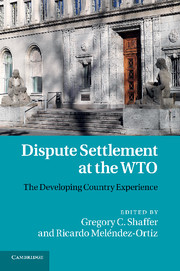Book contents
- Frontmatter
- Contents
- List of tables
- List of figures
- List of contributors
- Preface: The ICTSD dispute settlement project
- Introduction
- Part I Case Studies from South America
- Part II Case Studies from Asia
- Part III Case Studies from Africa
- 7 South Africa's experience with international trade dispute settlement
- 8 WTO dispute settlement for a middle-income developing country: the situation of Egypt
- 9 Sub-Saharan Africa and WTO dispute settlement: the case of Kenya
- 10 Conclusion
- Index
- References
7 - South Africa's experience with international trade dispute settlement
Published online by Cambridge University Press: 07 September 2011
- Frontmatter
- Contents
- List of tables
- List of figures
- List of contributors
- Preface: The ICTSD dispute settlement project
- Introduction
- Part I Case Studies from South America
- Part II Case Studies from Asia
- Part III Case Studies from Africa
- 7 South Africa's experience with international trade dispute settlement
- 8 WTO dispute settlement for a middle-income developing country: the situation of Egypt
- 9 Sub-Saharan Africa and WTO dispute settlement: the case of Kenya
- 10 Conclusion
- Index
- References
Summary
Introduction
Article 3.2 of the World Trade Organization (WTO) Understanding on Dispute Settlement (DSU) provides that the rationale for dispute settlement is to ‘clarify the existing provisions’ of the WTO Agreements ‘in accordance with the customary rules of interpretation of public international law’. However, African countries have not made significant use of the DSU and where they have used it, have done so only as either respondents or as third parties. There is thus a dearth of African experience in international trade dispute resolution, which this chapter attempts to help remedy through reference to the South African experience, such as there is.
Section I provides background on the importance of South Africa in the African context.Section II considers South Africa's institutional structure and processes (both those applied and the ideal), with references to the disputes in which South Africa has been involved. It examines the methodology used to ascertain the necessary facts in disputes and identifies the gaps that currently exist in the procedure to defend a case. It notes that a vacuum exists as regards the procedure to be used when a domestic industry is of the opinion that its rights have been infringed in a third country. Sections III–VI then evaluate the technical expertise available in South Africa and provide an overview of dispute settlement within the Southern African Customs Union (SACU) and the Southern African Development Community (SADC).
- Type
- Chapter
- Information
- Dispute Settlement at the WTOThe Developing Country Experience, pp. 251 - 274Publisher: Cambridge University PressPrint publication year: 2010
References
- 3
- Cited by



